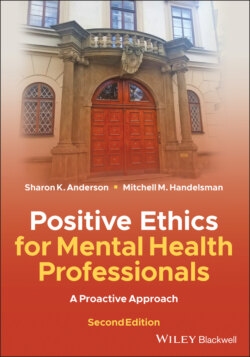Читать книгу Positive Ethics for Mental Health Professionals - Sharon K. Anderson - Страница 27
Professional Identity and the Moral Core
ОглавлениеBurke (2003) describes identity as “what it means to be who one is” (p. 1). Blasi (1984) suggests that identity is “rooted in the core of one’s being” and is an “organization of self-related information” (p. 130). According to Blasi, the organized, self-related data are so critical that without them “the individual would see himself or herself to be radically different; those so central that one could not even imagine being deprived of them; those whose loss would be considered and felt as irreparable” (p. 131).
Part of our identity is our moral core—our notions of right and wrong. Blasi (1984) suggests that moral/ethical ideals “are powerless if they are not rooted in a moral self” (p. 130). He also suggests one’s moral identity fuels (or is the moral/ethical motivation for) one’s moral/ethical action. To move from “powerless” to powerful or ethically excellent, we start with exploring and discovering your core—your essential moral self.
In our experience, the opportunity to uncover, explore, and articulate what resides in their core makes our students more able to think about how they fit with the profession, what it means to be part of the profession, and, consequently, how best to serve their clients, patients, students, consultees, and the broader society. We understand that you might be anxious to skip this part of your experience on the staircase—“Let’s just get to the good stuff!”—but these steps provide a critical root for growing your professional/ethical identity.
Developing a professional/ethical identity takes effort. We’ve discovered students typically fall into one of the following groups: Some students have never really considered some of the deeper levels of their identities. If they have done some good thinking, they haven’t really articulated their thoughts. Others can articulate what’s there, but they haven’t stopped to assess what is fundamental, missing, or problematic in their core. The last group includes those who haven’t explored the relationship between their core (central, non-negotiable) identity and its relationship to their developing professional identity.
Your awareness of your core, moral self provides the foundation for your professional identity—including your motivations, needs, values, and social identities. Knowledge of your core self helps you traverse the spiral staircase—to think about your relationship to the profession, to sustain your professional ethical identity for the long term, and to practice positive ethics. Thus, the foundation of a healthy and solid professional identity begins with understanding what’s in your core. Let’s start, or continue, your exploration with some reflecting.
